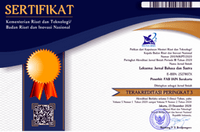THE MEANINGS OF SALUTATIONS AT ISLAMIC BOARDING SCHOOLS: AN ANTHROPOLOGICAL-LINGUISTIC STUDY (MAKNA SAPAAN DI PESANTREN: KAJIAN LINGUISTIK-ANTROPOLOGIS)
DOI:
https://doi.org/10.22515/ljbs.v3i1.1014Keywords:
pesantren, address terms, barokah, benefit, tributeribute.Abstract
This research aims to explains the meaning of some specific address terms such as kiai, gus, ning, kang, etc. which are obligatorily used on pondok pesantren in Jombang. This study discusses the classification and the meanings of address terms in pesantren as well as pesantren and Javanese cultural perspectives on the terms. This descriptive-qualitative research applies emic approach. The result shows that there are 15 address terms in pesantren, namely kiai, nyai, gus, mas, ning, bapak, ibu, mbak, kang, cak, ustadz, ustadzah, abah, abi, and umi. These distinctive address terms aim to honor the kiai, teachers, kiai’s and teachers’families, and santri. Pesantren’s view posits that respecting teachers, teachers’ family, and fellow santri is a pace to get barokah and manfaat (benefit) of science, the santri’s ultimate goal and their destination of seeking knowledge. Meanwhile, Javanese cultural persepective argues that this respect indicates syncretism between Javanese and Islamic culture. The respect to kiai is influenced by the respect to begawan. On the other hand, santri’s attitude refers to cantrik. Different tributes between teacher and kiai are influenced by Javanese culture. It indicates the existence of different obligations and rights in pesantren which impact on the stratification at pesantren. The stratification at pesantren can bedivided into three classes; namely nursery class (kiai and his family), teacher class, and santri class.
Downloads
References
Ahearn, Laura M. 2012. Living Language; An Introduction to Linguistic Anthropology. Oxford: Wiley-Blackwell
Anggraini, ND. 2017. Stigmatisasi Penggunaan Nama Sapaan di Kalangan Santri Pondok Pesantren Kiai Ageng Selo Dukuh Selogringging, Desa Tulung, Kecamatan Tulung, Kabupaten Klaten (Skripsi). Surakarta: FKIP Universitas Muhammadiyah Surakarta
Darban, Ahmad Adaby. 2008. Fragmenta Sejarah Islam Indonesia. Surabaya: JP Books
Dhofier, Zamakhsyari. 1984. Tradisi Pesantren, Studi tentang Pandangan Hidup Kiai. Jakarta: Pustaka LP3ES
Farchan & Syarifuddin. 2005. Titik Tengkar Pesantren: Resolusi Konflik Masyarakat Pesantren. Yogyakarta: Pilar Religius
Foley, William A. 2001. Anthropoligical Linguistics: An Introduction. Beijing: Blackwell Publishers Ltd.
Geertz, Clifford. 1989. Abangan, Santri, Priyayi dalam Masyarakat Jawa. Jakarta: Pustaka Jaya
Gunadharma, I. 2015. Campur Kode dalam Percakapan Santri Pondok Pesantren Darunnajah Ulujami Jakarta Selatan: Analisis Sosiolinguistik (Skripsi) Yogyakarta: FIB Universitas Gadjah Mada
Kaplan, David & Manners, Albert. 1999. Teori Budaya (Terjemahan). Yogyakarta: Pustaka Pelajar
Khumaidi. 2006. Sapaan di Lingkungan Pesantren: Studi Kasus Pondok Pesantren di Kabupaten Jember (Tesis). Yogyakarta; Program Studi Ilmu Linguistik FIB UGM
Koentjaraningrat. 1990. Beberapa Pokok Antropologi Sosial. Jakarta: Dian Rakyat
Mardiyah. 2012. Kepemimpinan Kiai dalam Memelihara Budaya Organisasi. Malang: Aditya Media
Mislikah, S. 2014. “Kesantunan Berbahasa dalam Interaksi Sosial di Pondok Pesantren
Mabdaul Ma’arif Jombang Jemberâ€. Fenomena 17 (1): 13-23.
Mushaf al-Quran Terjemah. Jakarta: Gema Insani Press.
Noer, Ahmad Syafi’i. 2001. “Pesantren: Asal Usul dan Pertumbuhan Kelembagaan†dalam Nata, Abduddin (ed.). Sejarah Pertumbuhan dan Perkembangan Lembaga-lembaga Pendidikan Islam di Indonesia. Jakarta: Grasindo
Poerwadarminta. 1939. Baoesastra Djawa. Jakarta: JB Wolters’ Urtgevers Maatschapappij
Putri, AT. 2014. The Terms of Address Used by Javanese Santri (A Case Study in Darul ‘Ulum Islamic Boarding School, Jombang) (Skripsi). Malang: FIB Universitas Brawijaya,
Saadah, I. 2016. Asrumi & A. Badrudin. “Penggunaan Kata Sapaan pada Masyarakat Jawa di Desa Jombang Kecamatan Jombang Kabupaten Jemberâ€. Publika Budaya 1 (1): 1-7
Sakdiyah, F. 2014. Implementasi Konsep Keadilan oleh Kyai Pelaku Poligami (Studi Kasus Kyai Jombang) (Skripsi). Malang: Fakultas Syariah UIN Maliki
Sofwan, Ridin dkk. 2000. Islamisasi di Jawa. Yogyakarta: Pustaka Pelajar,
Sukamto. 1999. Kepemimpinan Kiai dalam Pesantren. Jakarta: Pustaka LP3ES,
Sutinah & Siti Norma. 2004. “Stratifikasi Sosial: Unsur, Sifat, dan Perspektif’ dalam
Narwoko, J. Dwi dan Suyanto, Bagong (eds). Sosiologi: Teks Pengantar dan Terapan. Jakarta: Prenada Media Group
Tiani. R. 2016. “Kajian Perilaku Pragmatis terhadap Tindak Tutur Santri
terhadap Kiai di Pondok Pesantren di Wilayah Kota Semarangâ€. Humanika 23 (2): 32-39
Waris. 2015. “Pendidikan dalam Perspektif Burhanuddin al Islam Az Zarnujiâ€. Cendekia (13) 1: 69-85
Yasadipura I. - Babad Tanah Jawi Buku II (Terjemahan). Jakarta: Lontar Amanah
Yuliati. 2015. Penggunaan Sapaan dalam Tuturan Santri di Pondok Pesantren Al Amien Prenduan Sumenep (Skripsi), Malang: FKIP UMM
Zarnuji. 1963. Ta’limul Muta’allim. Kudus: Menara Kudus
Downloads
Published
Issue
Section
License
The copyright of the received article shall be assigned to the publisher of the journal. The intended copyright includes the right to publish the article in various forms (including reprints). The journal maintains the publishing rights to published articles.
In line with the license, the authors and users (readers or other researchers) are allowed to share and adapt the material only for non-commercial purposes. In addition, the material must be given appropriate credit, provided with a link to the license, and indicated if changes were made. If authors remix, transform or build upon the material, authors must distribute their contributions under the same license as the original.







